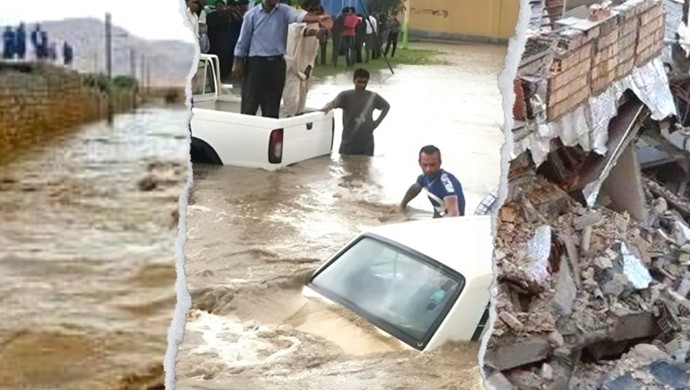Sixteen counties and hundreds of villages in Sistan and Baluchestan Province have been grappling with floods, devastation, waterlogging, and damage to thousands of hectares of agricultural and horticultural lands, greenhouses, rural and tribal livestock, agricultural machinery, canals, dozens of kilometers of roads, and water management structures for over a week. Tens of billions of rials of financial damage has been inflicted on this impoverished region. Thousands of flood-stricken and trapped individuals, surrounded by overflowing waters from dams, have no refuge or hope except for the voluntary assistance of their compatriots and the noble people of this region. Throughout the dictatorships of the shah and the mullahs, the people of Baluchestan have only seen repression and deprivation by the ruling regimes.
Authorities send ballot boxes but not aid
The raging rivers and severed communication routes have practically made it impossible to reach thousands of compatriots. However, the mullahs’ regime used helicopters belonging to these very people to transport election ballot boxes to crisis-stricken areas.
On March 4, the state-run Khabar Online quoted the head of Bahukolat Council in Dashtiari County as saying, “We requested helicopters several times, but unfortunately none of the organizations were willing to send helicopters. Yesterday, there was a helicopter in the sky, and when we asked, we realized that apparently one of the ministers was present with provincial authorities, they just circled in the sky and left. Neighboring provinces (such as Kerman and Hormozgan) also refused to send even one helicopter to help our noble people and save their lives. The people are enduring difficult conditions.”
Additionally, the cities of Nikshahr, Qasr-e Qand, Dashtiari, Chabahar, Konarak, Khash, Sib and Suran, Fanuj, Iranshahr, Mirjaveh, Delgan, Saravan, Zahedan, Nimruz, Sarbaz, and Mehrestan are also affected by floods and have suffered damages.
On March 5, Mehr News Agency quoted the head of the regime’s Crisis Management Organization as saying, “1947 villages have been affected by floods and suffered damages, with Chabahar and 480 villages and Nikshahr with 330 villages experiencing the highest level of damage. More than 25 main and secondary roads in the province have also been closed.”
On March 2, the state-run Tosee Irani newspaper wrote, “While images of ballot boxes were shining on the screens of the state-run broadcaster [IRIB], the images of people’s homes collapsing in a neglected corner of the country due to the raging waters of the flood were being ignored.”
Widespread boycott of the elections
Iranian regime supreme leader Ali Khamenei would used every hour and minute to execute plans to consolidate his hold on power, including staging the election charade to gain legitimacy. Meanwhile, he did not care about the suffering and calamity in Baluchistan.
Khamenei does not want to admit to the fact that since March 2023, he has been consistently advocating for a vibrant election with high turnout, and was persistent about it until the very last moment. However, the fire of the popular boycott of the elections burned unraveled his dreams.
On March 4, the state-run Asr-e-Iran website quoted a regime expert as saying, “The Islamic Republic system, despite all the emphasis that the Supreme Leader, especially in the past two months, repeatedly talked about the importance of the Majlis (parliament), has not achieved a suitable outcome with such an investment.”
This disgrace has also been acknowledged by the so-called reformists. On March 3, the state-run Fararu website quoted the cleric Mohammad Ali Abtahi, as saying, “If the demands of those who did not vote or cast blank ballots, which overall the majority of the Iranian people accept, are ignored again, the center of power will become narrower, the dissatisfied will increase, and governance will become more difficult.”
On March 3, Eslahat News website quoted a member of the same faction, Mohammad Javad Haghshenas, as saying, “A ballot box that is not based on the will of the people and all intellectual spectrums, what difference does it have from a tomato box?”
The extent of admissions and acknowledgments of the regime’s deadlock in gaining legitimacy and its incapability to sustain the widespread religious fascism is very vast. However, on the other side of the political stage in Iran, there is a brave battle by Resistance Units to break the regime’s spell of repression.





